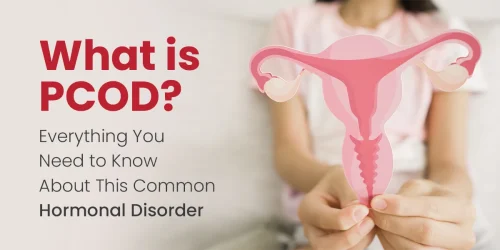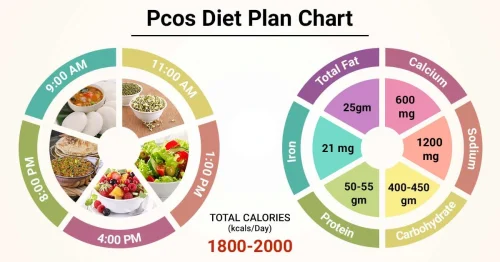
PCOD Diet Chart: Foods to Eat & Avoid for Better Health
Polycystic ovary syndrome (PCOD) is a common hormonal disorder often linked to lifestyle choices and stress. Following a balanced PCOD Diet Chart plays a key role in managing symptoms by supporting insulin control, reducing inflammation, and promoting a regular menstrual cycle. A healthy diet includes whole grains, vegetables, lean proteins, low-GI fruits, and healthy fats. It also means avoiding sugary snacks, refined carbohydrates, fried and processed foods, and excessive dairy. Along with the right food choices, daily exercise, proper sleep, and stress management can further improve hormonal balance and overall health for women living with PCOD.

PCOS Diet Chart: Foods to Include
Eating the right foods is essential to managing PCOS because they help balance hormones, assist in controlling insulin levels, lower inflammation, and help with weight management. The goal is to eat whole foods in their natural form, which are nutrient-dense and stabilize blood sugar levels, paramount in overall bodily function.
Whole Grains and Foods Rich in Fiber:
These foods assist with digestion, regulate blood sugar levels, and support weight management — they are all important for PCOD health.
Examples include: Oats, quinoa, brown rice, millets (bajra, jowar, ragi), whole wheat chapati, beans, lentils, legumes, leafy greens, and fresh vegetables.
Lean Protein:
These support satiety, improve muscle health, and provide natural boosts in metabolism.
For example: Eggs, grilled or steamed chicken and fish, paneer, tofu, sprouts, and Greek yogurt (in moderation).
Healthy Fats:
These help reduce inflammation, assist with hormone balance, and improve skin and hair health.
Some examples: Almonds, walnuts, chia, flax and pumpkin seeds, olive oil, coconut oil, and avocado.
Low-Glycemic Index (GI) Fruits:
These foods provide vitamins and antioxidants while providing stable energy and blood sugars.
Examples: Apples, pears, berries, guava, pomegranate, kiwi, and oranges.
Anti-Inflammatory and Hormone-Balancing Foods:
These do assist with reducing bloating, acne, and fatigue associated with PCOD symptoms because they calm inflammation.
Examples: Turmeric, ginger, cinnamon, and herbal teas (especially spearmint tea).
PCOD Diet Chart: Foods to Avoid
When managing PCOD or hormonally-related health issues, diet plays a big role—just like other lifestyle choices. The PCOD Diet Chart helps guide healthy eating by avoiding foods that spike blood sugar, promote weight gain, increase inflammation, or disturb hormonal balance. Reducing these foods can support clearer skin, stable mood, regular periods, and better insulin control, making it easier to manage PCOD naturally.
Sugary foods & drinks
These raise blood sugar quickly and worsen insulin resistance, which can trigger more hormonal imbalance.
Candy, pastries, chocolates, ice cream, sweetened beverages, sodas, packaged fruit juices
Refined carbs
Low in fiber and nutrient value, they cause weight gain and hormonal fluctuations.
White bread, white rice, maida-based chapati/pasta/noodles, biscuits, cakes, bakery items
Processed & junk foods
High in unhealthy fats, preservatives, and sodium — they increase inflammation and cravings.
Burgers, pizza, fries, packaged snacks, instant noodles, and ready-to-cook mixes
Fried & oily foods
Deep-fried foods lead to weight gain, inflammation, and hormonal imbalance.
Pakoras, samosas, bhujia, pooris, and other deep-fried snacks
Excess dairy & fatty meats
Too much dairy and fatty meats may trigger acne, weight gain, and hormonal issues.
Full-fat milk, cream, cheese, butter-rich foods, processed meat, red meat (limit)
High-sugar fruits (limit)
Although healthy, they can spike blood sugar if eaten in large amounts.
Mangoes, bananas, grapes, chikoo
Caffeine & alcohol
Increased stress hormones and disturbed sleep affect hormone balance.
Too much coffee/tea, energy drinks, alcoholic beverages

Homeopathy Treatment for PCOD
Homeopathy is a natural and multidisciplinary way to tackle the PCOD dynamics by addressing causes instead of symptoms. It can assist in balancing hormones, improving ovarian function, regulating periods, decreasing insulin resistance, and even promoting emotional health. Homeopathic medicines can also help with acne, hair fall, weight gain, and mood swings associated with PCOD. Homeopathy treatment is individualized based on a woman’s symptom picture, lifestyle, and medical history, making it safe for long-term treatment without side effects. Homeopathic approaches can be a great adjunct treatment to a healthy diet, exercise, managing stress, and good sleep hygiene to provide longer-lasting relief and enhanced reproductive health.

Disclaimer
The information in this blog is provided for educational and general awareness purposes only and is not intended for medical advice. The information is not a substitute for professional medical advice, diagnosis, or treatment. Each person’s health conditions will differ, and results will differ based on individuals. We always urge you to call your doctor, qualified healthcare provider, or certified homeopathy doctor before initiating any diet changes, lifestyle changes, or treatments for PCOD or any other health condition.
Frequently Asked Question (FAQ’s)
What is The Best Diet for PCOD?
A diet that stabilizes hormones and keeps insulin balanced is the ideal diet for PCOD. Whole grains, fresh fruits and vegetables, lean protein, healthy fats, low-GI fruits (like berries), and lots of water (try to drink at least 3 liters of water per day). Avoid sugar, refined carbohydrates, junk food, and frying foods. A balanced, whole, natural diet that is nutrient-dense can reduce PCOD symptoms and promote better health overall.
How Does a PCOD Diet Help in Weight Loss?
A PCOD diet focuses on managing insulin levels, boosting metabolism, reducing inflammation, and cravings for unhealthy food. High-fiber foods, lean proteins, and healthy fats will keep you full for longer periods, attributed to burning fat. This also occurs without following a restrictive diet.
Can a PCOD Diet Improve Fertility?
A healthy PCOD diet can help improve fertility. Foods that can stabilize hormone levels can increase ovulation, assist with the regulation of periods, and improve overall egg quality. With all of the necessary medical care and lifestyle changes, many women begin to see an improvement in fertility.
Conclusion
With the appropriate diet and lifestyle, it is easy to manage PCOD. Eating whole grains, vegetables, lean protein, healthy fats, and low-glycemic index fruit helps balance hormones and control insulin levels. To better maintain weight and hormone balance, stay away from sugary, processed, and fried foods. Along with a balanced diet, consistent exercise, adequate sleep, managing stress levels, and homeopathy can lead to long-term recovery and hormonal balance. Under the guidance of experts like Dr. Deepika’s Homeopathy, women with PCOD can follow the right approach and achieve effective results. With healthy habits practiced consistently, women with PCOD are able to lead a balanced, confident life full of energy and wellness.